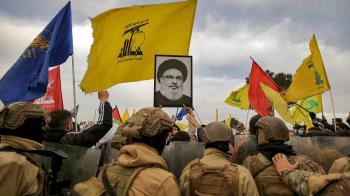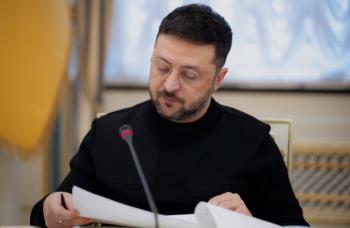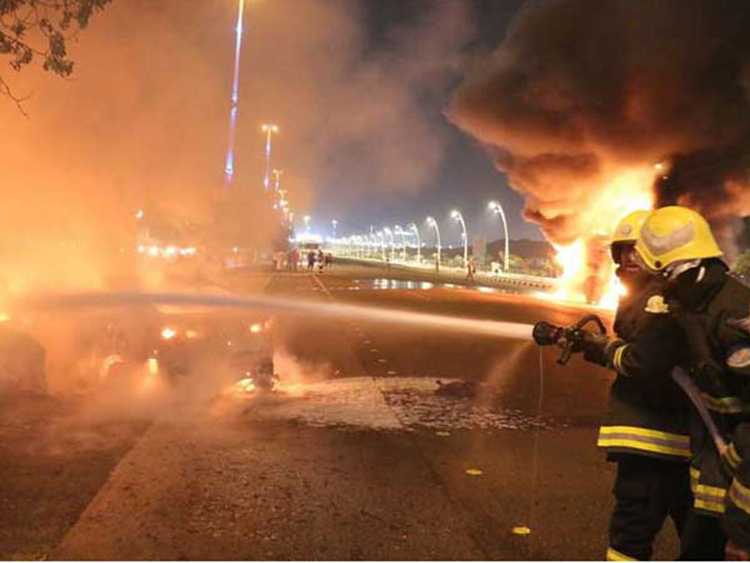Alwaght- On Friday, the Yemeni army's spokesman General Yahya Saree announced a new round of "successful" missile and drone attacks by Ansarullah Movement on Saudi oil giant Aramco's refining facilities in response to ongoing inhumane actions by Saudi Arabia including prevention of fuel to Yemen as a desperate need for the besieged nation.
Since 2019, the year Saudi oil facilities in Abqaiq and Khurais in the east were first attacked by Yemeni missiles and drones as a deterrent operation, halting Saudi oil exports, Yemeni "deterrence operations" have been common targeting the Arab kingdom's economic and military infrastructure.
In the past two and a half years ago, the Saudis spent substantially to close the security loopholes making them vulnerable to Yemen's missiles and drones. Their arrangements included overt and covert deals with various world countries to procure new air defenses. But to their surprise and frustration, Ansarullah still manages to launch surprising attacks against their oil facilities. This prompts a question: Why has Saudi Arabia been unsuccessful in effectively thwarting Ansarullah attacks?
Saudi measures for boosting air defenses
Since the revelation of the weakness of its missile interception systems in the face of the Yemeni attacks, Saudi Arabia has made extensive moves to purchase world's advanced systems.
Although the Saudis meet most of their strategic military needs through arms deals with Western countries, they have even considered other suppliers' air defenses, including China and Russia.
In 2017 and during King Salman's Russia visit, Riyadh struck a deal with Moscow to buy S-400 air defenses. Saudi Arabia also signed an MoU with Rosoboronexport and SAMI companies to boost military cooperation. In February 2018, Russian officials held further talks with the Saudi ambassador to Moscow on the purchase of the S-400 systems, and even after the 2019 attack on Aramco, Russian President Vladimir Putin explicitly expressed his desire to sell the S-400 to the Saudis, saying: "Saudi Arabia just has to make a wise decision."
This negotiations continued during Russian Foreign Minister Sergei Lavrov's Saudi Arabia visit in March 2021, when he met Crown Prince Mohammed bin Salman. Al Araby news network at the time reported that S-400 deal was among the issues discussed with Riyadh.
Riyadh has also considered buying air defenses from others providers, including the Israeli regime. In September last year, media spoke of secret talks between Riyadh and Tel Aviv to provide to the Saudis Iron Dome batteries, a short-range air defense system originally developed to intercept Gaza-based Hamas rockets, and also Barak 8 missiles.
Despite all these efforts, air defense weakness against Yemeni attacks remains in place, pushing Saudis to eye other systems from other providers. This need overshadowed world Defense Show held in the kingdom in early March.
"Visitors to the Riyadh show are zooming in on anti-drone and air defense systems," according to Tomas Kossowski, chief operating officer for Advanced Protection Systems.
The Polish firm sold its infrastructure-defense products to Saudi Arabia's national telecoms operator in 2019 and has since been in negotiations with other potential customers. Kossowski said interest from the Gulf in "defending critical infrastructure" was growing every month.
"There is very much high interest in the region for the capabilities to defeat drones and IEDs," said Bobby Strawbridge of US firm Allen-Vanguard, which makes equipment to block radio-controlled weaponry.
While during the exhibit the Saudi Military Industries Corporation made 22 deals with national and international companies worth about $2 billion and the government plans to build 50 percent of the weapons it needs by 2030 at home, under a deal, the first of its kind in Saudi Arabia, the American defense company Lockheed Martin will work with Riyadh to produce components for Terminal High Altitude Area Defense (THAAD).
This agreement is not new, however. In October 2017, the US State Department gave a go-ahead to THAAD delivery to Saudi Arabia as part of a broader $15 billion contract. But this missile system is not expected in the kingdom at least before 2023.
Ansarullah makes surprise as a continuation to Axis of Resistance's technological power
But while Riyadh and its allies continuously fail to provide security cover to its vital and economic infrastructure against Yemen's missile attacks, stunning are Ansarullah's military advances, including construction and usage of modern combat drones and ballistic missiles, that render Saudis disappointed with checking the Yemeni attacks on their oil and military facilities.
Actually, Ansarullah is always one step ahead of Saudi Arabia and the Western military advisers in updating the tools and methods of achieving its military goals on Saudi soil. With every Riyadh move to cover weakness of its security wall, it is Ansarullah that inflicts defeat on the enemy with new tricks and tactics.
This Yemeni success is powered by a strong technological background applied also by Lebanese Hezbollah and Gaza's Hamas when their rockets penetrate an air cover provided by much-vaunted Iron Dome systems in war against the Israeli regime. To put it another way, today, defense technological cooperation of Axis of Resistance wings have turned on its head the military balance in Yemen war and Israeli-Hezbollah cold war.



























